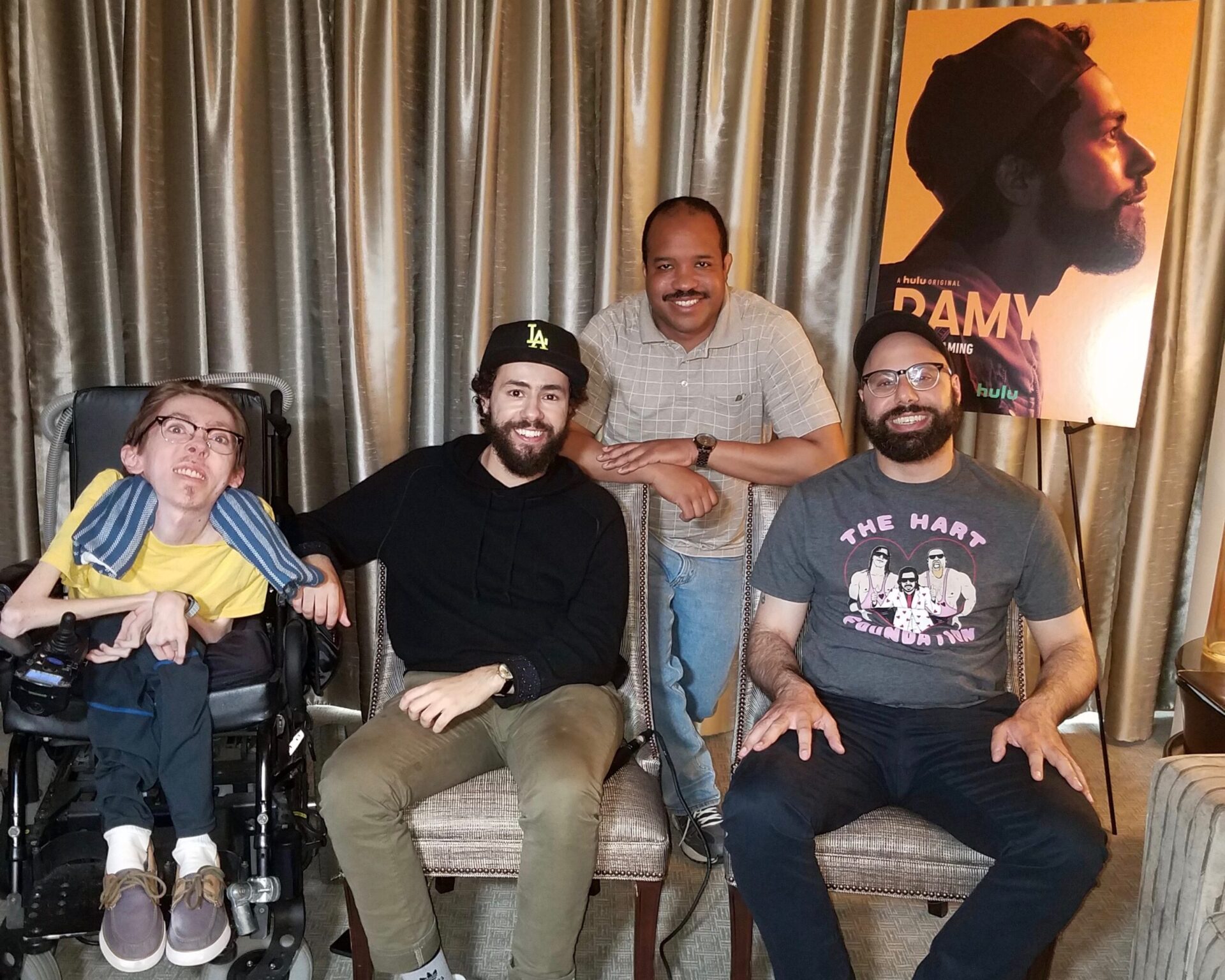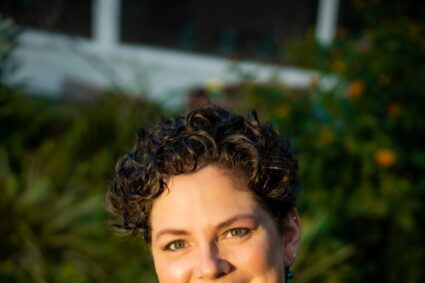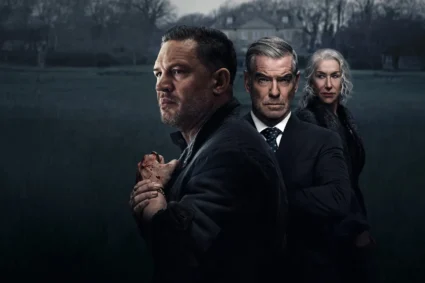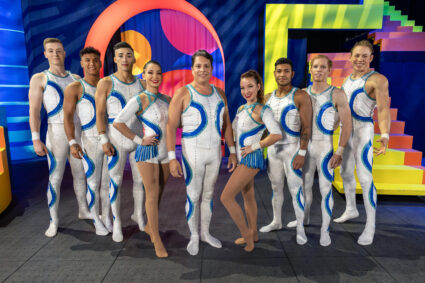
On this edition of THE INTERVUE, I talked to the cast members of the new Hulu series “Ramy”. The new comedy, launched April 19th, tells the story of a twenty-something, first-generation Egyptian-American who is on a spiritual journey in his politically-divided New Jersey neighborhood. RAMY offers a new perspective to the screen as it explores the challenges of what it’s like being caught between a Muslim community that thinks life is a moral test and a millennial generation that thinks life has no consequences. I recently sat down with the star, creator and executive producer Ramy Youssef, comedian Steve Way who plays “Steve” and comedian Dave Merheje plays “Ahmed”
Let’s start with you, Ramy. I wanted to know, how did you get involved with “Ramy,” and does some of the material come from your personal upbringing or your childhood?
Ramy Youseff (RY): Yeah, I mean, a lot of it comes from my standup. I started by figuring out stories that I wanted to tell onstage, and from that perspective, it grew into a show, and so many of the things are not necessarily from my real life, but I try to imagine maybe a different way that I might have reacted to a certain situation. Or, I try to imagine, “ok, I have a very communicative family, what would it look like if my family talked a little bit less?” What would it look like if I had a life where I didn’t have a creative outlet? How would I react? And so, it’s sort of setting this slightly alternate version of my reality while still including my friends. You know, Steve, who I’ve been friends with since the third grade and Dave, who I’ve known for the last ten years. Kind of bringing them in so that we could play with our real emotional dynamics, but in this slightly altered universe.
That’s great! Steve, you have been one of the comedic stealers of the show. When did you realize that you were funny and you wanted to be a comedian?
Steve Way (SW): I realized when basically one day, Ramy told me that I was about to be a comedian.
(laughs)
SW: It was a couple of week before Ramy and a couple of our friends were putting on a comedy show in their hometown. It was the dead of the summer and Ramy says, “Steve, write your stand-up set.” So I wrote it, and he’s like, “great! You’re going to perform it.” And that was it.
That was it?
Yeah, that was it, because we went to the same television program together in high school and it was—
What was the television program, if I may ask?
RY: It was just our—Rutherford High School in Jersey—it was our like, in-house TV class.
(excitedly) Nice!
RY: Yeah, yeah, yeah.
Represent, because I actually did television production in my high school too!
RY: Oh yeah! So it’s where you learn the basics of stuff. It was me and Steve and our friends Jonathan and Kyle and we started making videos together, and then it became really clear that Steve’s timing was amazing. Because standup is so much about timing, so yeah, I do remember kind of thinking, “dude, this is what you’re gonna do.”
DR: Excellent! Dave, I want to say congratulations on your recent Juno Award.
Dave Merheje (DM): Oh, man, those Junos get a lot of airtime, I love it.
DR: (laughs)
Talk to us about your character and how does it parallel to your real life?
DM: Well, I’m Christian, the character’s Muslim. He’s more focused. I think has a better direction, prays more than I would pray in real life. I pray every day, except when I’m intoxicated I don’t pray, because I think God might yell at me.
(all of us laugh)
RY: God would not yell at you, man.
DM: My mom told me he would. He wants to see—the character wants to see Ramy at his best, and looking out for him. And in real life. It’s not like I want him to do that…(air quotes)
(DR, SW & RY laughs)
DM: And hes more diligent and he’s more on him on the show to be good and his ideal of what good is and be on the right path and the right focus.
We’ll turn it back to Steve. I read in your bio that your greatest accomplishment in life so far is public speaking. And I want you to talk to us about that, and I also read that you were a substitute teacher at one point.
SW: Shout out to Rutherford High School. Yeah, I’ve been a substitute teacher since 2011. In college, I was in the Teacher Education Program, so I was forced to get my substitute teaching license. After college, I realized I wasn’t dead yet, so I had to get a job. I figured I should have done a job that requires the least amount of work, but still, get paid for it. So I figured, I sit at home all day, so why not sit at school all day and get paid for it?
(DR, RY & DM laughing)
‘Cause all I have to do is take attendance and make sure that my students don’t murder each other. Very easy, very easy.
That’s true. I can relate to that. (laughs)
RY: That’s a low bar.
SW: Very low bar, but I do it spectacularly. But yeah, I love public speaking, because I feel that I can combine what I love in standup comedy with making people laugh while also educating people about my life, what it’s like having a disability, and just everyday trials I go through but still have fun with it. I’ve spoken to third graders all the way up to college kids. You know, I just love meeting new people, hearing their stories and hearing their feedback, because it makes me, not just a better performer, but really, a better person.
Absolutely, Ramy, Is there a difference between doing stand-up comedy on a stage to doing comedy on a television series?
RY: Yeah, I mean, it’s way different on TV, because the laugh comes two years later.
Two years later? (laughs)
RY: It’s, you’re making something, you’re writing, and then it just came out a couple of days ago, and then I’m like, “oh, ok, people find it funny.” Stand-up is so immediate. You think of an idea in the morning, you can go try it that night. It’s way different. So much of what goes into a television show it’s…you’re just testing it in a different way, in a different manner. But the standup is essential for this show. We’d be in the writers’ room, we’re figuring out some dialog, we’re figuring out an idea, a premise, and I would go and try it at the comedy club that night. I’d be like, “let me go try this out,” and then come back to the writers’ room and be “ok yeah, that works,” or “yeah, this is actually what I found onstage. That could be the dialogue.” All the standup premises that are personal and that are genuinely about feelings and are genuinely timeless, all of those translate over really well into a show. All those jokes about what some politician did yesterday, that won’t really work, but things that are about who you are and that is human, those translate over really nice.
You mentioned that the objective for the show is not to turn into a PSA defending your religion. Can you emphasize on this?
RY: Yeah well, it’s important for this to look like real people. It’s important for this to feel messy, it’s important for this to explore ideas that the screen is uniquely tailored to talk about, and so we focus on the things that are not the most flattering but they are things that I think we need to work through just as humans, so some of them are particular to our community, but others are just things we’re trying to figure out how to deal with. You know, that one family member, or different sexual experiences, or whatever someone goes through and trying to figure out their place. These are all things that in order to do the right way, you can’t approach a show like this by saying, “well, I want people to think all Muslims are good or they look good,” because once you put that on yourself, you’re really limiting what you can create.
DR: I’m going to start with Dave. Who are some of the comedic influences that you realize when you saw this person onstage or on television, you thought, “I want to be like that person?”
DM: Ramy and Steve.
(DR, RY, SW & DM laugh)
DM: I’d say Richard Pryor, Mike Epps, Katt Williams.
RY: Comedic influences? My uncles and George Carlin. And George Carlin, by the way, was shown to me by my uncle at a very early age. Too early.
(laughs)
RY: I think I was like ten. It’s too much to hear, to rant about, but, yeah.
SW: Dave Chapelle, and our high school TV teacher, Mr. Webber and Ramy.
RY: Webbs, yeah I would say Webbs is up there. He’d be sitting in the basement for so long and then he’d look at me and say, “can you go use the bathroom for me?”, because he hadn’t moved all day, so he’d be like, “you go do it for me.” It’s a good bit. It’s a good bit, a classic bit.
DM: I’d say my dad.
RY: Your dad’s an influence? I mean, your dad is definitely an influence, yeah.
Now that you’ve wrapped season one and it just premiered, what are some of your fondest memories of filming the very first season?
SW: I was just having the opportunity to have fun with Ramy. We would do a couple of takes of a scene, you know, a line from a line from the script, and Ramy would say, “just have fun with it. Just say whatever you want.” And probably, a least a quarter of what you see between me and Ramy on the show is improv.
DM: There was like, the diner scene with all four of us, Mo, Ramy and Steve. I’ve done stand up with Ramy and Mo, and me and Steve took an acting class before we started filming, so having all four of us, and then I think it was like, being on set. ‘Cause I’m from Canada, originally. I got a green card, and always wanted to act in America, so just every day probably.
RY: I think for me, you know, it’s such a different reaction from the stage. The laughs come later, the moments come later. What was really exciting was every time a scene would work, we’d get a scene to a place and I could just be like, “oh man, it worked!” like it worked from the pit. That was really exciting. It was super exciting. I got to direct an episode that I wasn’t it. That was great, because I was really feeling it. I wasn’t even in this scene. I was watching it from the outside, I was tinkering and we’re making it perfect. That was just…it’s the best, because it’s in your head for so long and then it gets to the page and it’s a little different. And then it’s on the page and it gets to the set and it’s a little different, and then it becomes what it actually is. And so, that, going through the process for the first time on this scale was really exciting.
DR: Excellent. Now, what do you think your audience will take away from the show overall?
RY: Overall, I just hope that people have a little bit of a different association with certain things. You know, I think people who don’t know anything about Muslims, hear about a mosque or even hear the word Allah and they think of something dark, and hopefully you’ll watch your show and you’ll think, “oh no, Allah is just something that we all say in some version when we’re looking for guidance, when we’re in a situation, and the mosque is something that is a place you can go when you have a problem and where you can have a sense of community. And the reframing of a couple of those things, and if anyone could just watch it and be a little more sure, or less sure of whatever it is that they think, then that would be really cool. I don’t want to change anyone’s mind, but maybe if your stance is a little less defined, that would be really cool.
Watch the entire first season of “Ramy” – NOW STREAMING on Hulu
If you want to follow the cast of “Ramy” – here’s where you find them on social media!


